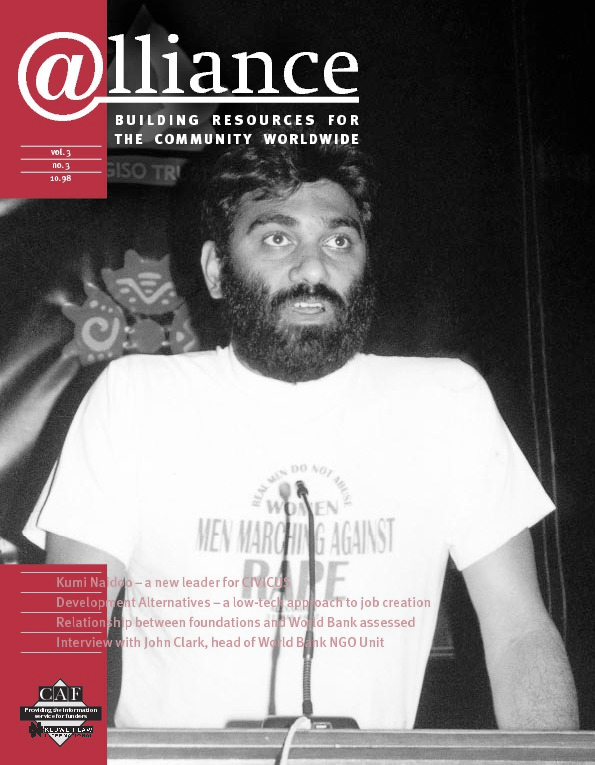It is estimated that there may be 350,000 deafblind people in India. Only 23 are currently receiving special education. In a country as vast as India the problems may seem impossibly daunting, but much can be done with very limited resources, as is demonstrated by the work of Sense International (India). Finding the £6,000 per year they were looking for proved unexpectedly difficult, however – a clear example of funders’ agendas not matching the needs of recipients.
Pradeep is deafblind. He was born completely deaf with a deteriorating visual impairment that left him totally blind by the age of 14. He is highly intelligent and people communicate with him by writing on his hand. From Calcutta Pradeep studies in Mumbai (formerly Bombay) – one of 23 deafblind students at the Helen Keller Institute for the Deaf and Deafblind, until last year the only school in the whole of India offering education for deafblind people.
It is thought that around one in every 2,500 people is deafblind – that is, both deaf and blind. This does not sound a tremendous number, yet in a country as large as India there could be more than 350,000 deafblind people – and only 23 receiving appropriate education.
Like Pradeep, these other students travel many miles to the Institute. At the end of each term they go home to their families where, very often, no one can communicate with them and they just wait for the next term to start. But in reality these 23 are the lucky ones; we simply do not know what happens to the thousands of other deafblind people in India.
A strategy for India
Sense is the UK national deafblind organization, founded over 40 years ago and now the largest deafblind organization in the world. For many years requests for support were received from throughout the world, especially from the Helen Keller Institute in Mumbai. This pressure led to the creation of Sense International in 1994 and the immediate decision to make India its top priority.
From the start we felt that we had no right to make decisions about India from an office in London. If services for deafblind people were going to develop in India it would be because Indian people wanted it to happen and were prepared to make it happen. It would have been easy to decide otherwise: Sense has many years’ experience working with deafblind people and a large number of highly qualified and skilled staff to call upon. In effect it was decided that Sense International should act like a development NGO working in the deafblind field, rather than the all-knowing wing of a British charity.
An exploratory visit to India was made to discuss strategies and possibilities with the Helen Keller Institute and a whole range of other schools and organizations. Advice was also sought from a number of UK NGOs with years of experience of working in India.
The recommendation from colleagues in India was that we should appoint an Indian Development Manager who would consult more widely before recommending the direction in which we should proceed.
Finding a funder
This strategy was beautifully simple, supported by all our contacts in India, and remarkably cheap. In effect the only funds required were for the Development Manager’s salary and very limited overheads and travel costs within India. The total amount needed to implement the whole plan was less than £6,000 per year. We thought we would have no problem raising such a relatively small amount of money, yet it took more than a year to identify a funder!
In retrospect this was a clear example of funders’ agendas not matching the needs of the recipients. It would have been easier to raise ten times that amount for a brand new deafblind school in Calcutta or an extensive community-based programme in Tamil Nadu. But we did not have such projects – it would be the Development Manager’s job to identify them.
For many donors the concept of a Development Manager sitting in their own living room on the telephone is simply not attractive. Certainly not as attractive as a lovely new deafblind school.
Another problem we faced was that people laughed when we said how much money was needed. ‘What can you do with £6,000?’ ‘You’ll never get anyone decent on a salary like that.’ People had not the slightest idea about costs in India, where 5,000 rupees (£80) a month is a perfectly reasonable salary for a fully qualified teacher in Mumbai. The reality is that for £6,000 it is possible to employ a very experienced Indian Development Manager and provide the initial start-up overheads and travel costs. In the end, to our delight, Allied Dunbar agreed to cover these costs.
Catalyst not service provider
On 1 January 1997 we appointed Akhil Paul as Development Manager. Akhil had seven years’ experience developing projects for the Indian National Association of the Blind so was well known in the field. Following an extensive induction programme he started an assessment of the situation in India in April 1997. His basic task was to gain an overview of the situation and to determine whether or not there was a role for Sense International. Only then would he try to identify exactly what that role should be.
What has emerged is that Sense International (India) will not be a direct service provider and will always work with Indian partners. Our role is to identify partners who are interested in developing services for deafblind people, work with them to put together project plans, seek funding, and then work with the partners as the projects are implemented. We want to act as a catalyst to stimulate developments that will ultimately be sustainable in their own right and not dependent on Sense International for their long-term success.
The first projects
Our first project partner was the Blind Men’s Association in the state of Gujarat. On 15 June 1998 a new deafblind unit was opened in Ahmedabad. It is part of a comprehensive package of services involving a centre-based unit, community-based projects throughout Gujarat, integrated education in school programmes and work with young deafblind adults. Seven new staff have been recruited, the coordinator has received training in Mumbai and the UK, and a series of training courses involving experts from the UK, the USA and India has been agreed. The overall cost of the project is less than £30,000 a year; the UK Department for International Development and the UK-based Sylvia Adams Charitable Trust have agreed to meet 50 per cent of this cost each for three years.
The next project, a vocational training programme for young deafblind adults, involved the Helen Keller Institute in Mumbai. This will create opportunities for young men like Pradeep, who are otherwise faced with a very bleak future. Five special educators will be recruited together with a vocational training manager and four support staff. Together with the older deafblind students they will develop a programme that will ultimately create work possibilities for deafblind people in areas such as woodwork, jewellery-making and stationery production. The overall cost of this project is about £16,000 a year; the UK National Lottery is providing funding for three years.
In addition to these two projects we have identified a number of other possibilities for which we are currently seeking funding. We have also developed a good relationship with the Government of India, which has requested our advice and training expertise in the establishment of a new National Institute for Multiply Disabled People. We are organizing the first-ever National Expert meeting on the subject of deafblindness, and Akhil Paul recently opened the third deafblind unit in the country at a school for deaf children in Madras. This school is receiving support from the National Deaf Institute in the Netherlands but Akhil is involved in the monitoring and evaluation of the unit as it develops.
In little more than a year a clear strategy for Sense International in India has been identified and a number of very exciting projects have started. Not bad for an initial investment of £6,000!
Working for sustainability
Sense International has a clear time limit of between three and five years for each project. During the lifetime of each project we will work with the partner organization to ensure that they have the capacity to maintain the project themselves. This means assisting the partner in areas such as management, fundraising and administration – functions that are arguably just as important as the deafblind skills we also aim to develop. We are therefore just as likely to arrange a training course in fundraising as one in working with deafblind children – a fact that has come as a pleasant surprise to Sense’s fundraisers who had not realized that their skills would be transferable to India.
This overall aim of sustainability also applies to Sense International (India). For the first two years the aim is to fund all activities from sources we can access from the UK. From April 1999 Akhil will have income generation targets and must undertake fundraising within India. While there is massive poverty in India there is also tremendous wealth and a large middle class.
A cost-effective approach
Experiences to date demonstrate clearly how much can be achieved in India for very little financial input. It goes without saying that costs in India are much lower than for comparable activities in the UK. We have also learned that by devolving responsibility to Indian people we can increase cost-effectiveness. The most obvious example is that we do not need an India Department in the UK: Sense’s India Desk is in India.
The difficulty for Sense International is to convince funders that investing in activities such as training, staff development and salaries is a more cost-effective way of improving the quality of life for deafblind people than putting up new buildings throughout the country. Perhaps even more difficult is convincing people that we really can substantially change the lives of many people for what is really not a tremendous amount of money.
Akhil Paul is Development Manager for Sense International (India) and Richard Hawkes is Director of Sense International.
For more information about Sense International contact Richard Hawkes.
Tel +44 171 272 7774
Fax +44 171 272 6012
E-mail si@sense.org.uk
For information about the work in India please contact either Richard Hawkes (as above) or Akhil Paul directly.
Tel +91 79 747 7185
Fax +91 79 662 1171
E-mail senseind@ad1.vsnl.net.in



Comments (0)